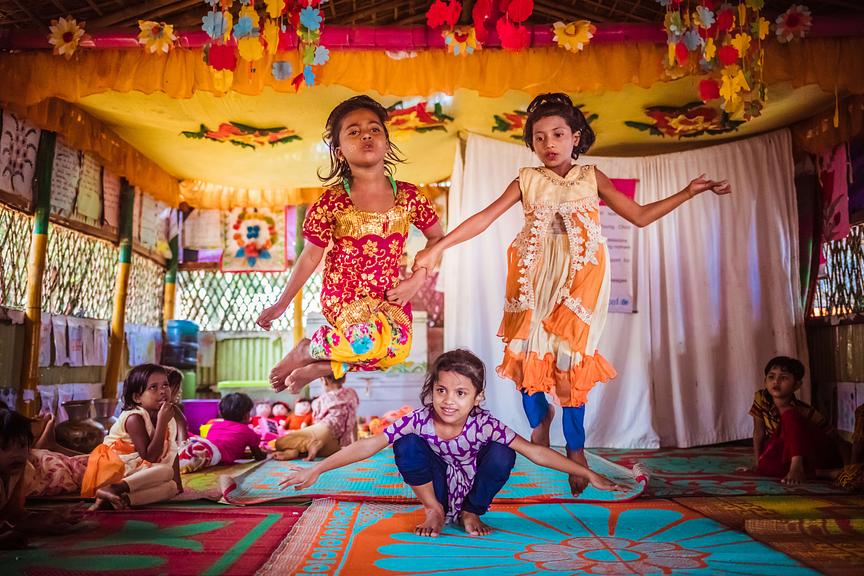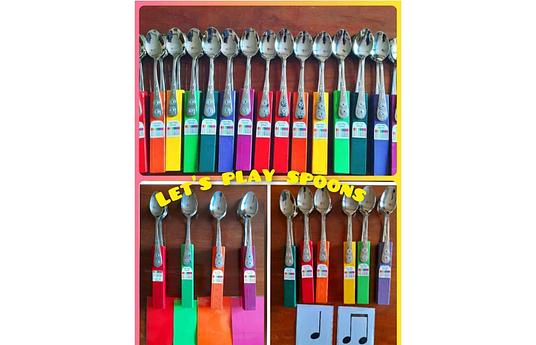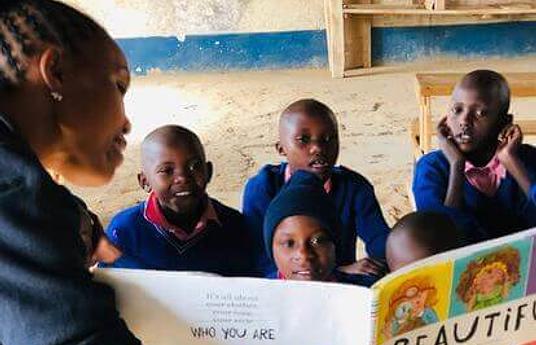The importance of early childhood development
Early childhood is a critical time in a child’s life. Research confirms that quality early childhood development (ECD) programming, and particularly play-based learning, during the first five years of a child's life can set up a child for lifelong success. But in low-resource contexts, children disproportionately lack quality ECD opportunities. BRAC's flagship ECD model, Play Labs, promote children's development and help the most vulnerable children grow into adaptable, resilient, socially and emotionally literate adults who can navigate the adversities of poverty and conflict later in life.
What are Play Labs?
Play Labs bring together beautiful play spaces, locally made play materials, engaging Play Leaders, a world class curriculum, and caregivers and communities to create welcoming, joyful environments where children can learn and develop.
BRAC equips passionate, engaging facilitators from local communities as Play Leaders who lead playful, child-centered activities. Our flagship Play Curriculum; designed by international experts in child development, education, and mental health; supports children's physical, social-emotional, and cognitive development, and activities are adapted to reflect local traditions and heritage. Play Labs also engage caregivers and communities and empower families with knowledge on early childhood development.
A recent two-year study in Bangladesh revealed that Play Labs improved children's development outcomes, reduced gaps between children's outcomes, and equipped parents with the knowledge and resources to support their children's development.
Adapting and scaling the Play Labs approach
In recent years, BRAC has adapted its flagship Play Lab approach in diverse settings—from South Asia to East Africa, from community spaces to government schools to crisis contexts—to demonstrate the transformative power of playful learning.
-
Humanitarian Play Labs: BRAC adapted its Play Labs approach for humanitarian and crisis contexts to enable children affected by crisis to learn, heal, and grow through play. In humanitarian contexts, the model has a particular focus on providing psychosocial support and early learning and stimulation opportunities that address trauma and provide a sense of routine and normalcy while supporting children's healthy development. In Cox's Bazar, Bangladesh, Humanitarian Play Labs reach Rohingya refugee children and children living in the host community ages 0-6 with centre-based and home-based playful learning opportunities. BRAC is also developing Humanitarian Play Labs in the context of the Rhino and Imvebi refugee camps in Uganda, drawing upon past experience implementing the flagship Play Lab model in Uganda and Humanitarian Play Labs in Bangladesh. -
Remote Play Labs: During the onset of COVID-19, BRAC adapted our flagship Play Lab model and Play Curriculum for accessible low-tech remote learning modalities, helping children build better futures at a crucial stage of their development amid the pandemic. Our Pashe Achhi (or "Beside You") telecommunications model in Bangladesh reaches children and their caregivers through 20 minute phone calls every week, using a script developed by BRAC’s in-house team of play-based curriculum developers and psychologists, and an ECD helpline uses interactive voice response messages and live helpline staff to provide caregivers with information and guidance on ECD. Remote Play Labs also deliver play-based learning content over national and community radio stations to reach millions of additional children. Beyond the context of the pandemic, we are continuing to scale our Remote Play Labs in low-resource and hard-to-reach contexts.
What's next
BRAC is committed to ensuring that all children can access quality playful early learning opportunities and that all caregivers have the tools and resources to support them. Play Labs are an invaluable opportunity to reach children and families with quality early learning opportunities, even in the most hard-to reach and resource-constrained contexts. We aim to continue adapting and scaling Play Labs in new contexts through partnerships with governments and others involved in promoting early childhood development globally to achieve a world where every child has access to quality, playful early learning opportunities that support their development.
Get involved
BRAC has developed the PlayBook, an open source toolkit to share the Play Lab approach and learning within the education and early childhood development communities. Our goal is to equip others with the tools to learn from, adopt, and contextualize Play Labs in their own countries and communities. Visit https://playlabs.bracusa.org to learn more and download the PlayBook.
About BRAC
Founded in Bangladesh in 1972 as a small relief effort, BRAC is now a world-class global development organization working in more than a dozen countries around the world. Ranked the number one NGO in the world for the eighth time in 2022, BRAC runs programs in education, youth empowerment, health care, agriculture, humanitarian response, and more. Play Labs build on the organization's expertise as one of the world’s leading education providers for marginalized children, with more than 12 million graduates of its pre-primary and primary programs.



